|
|
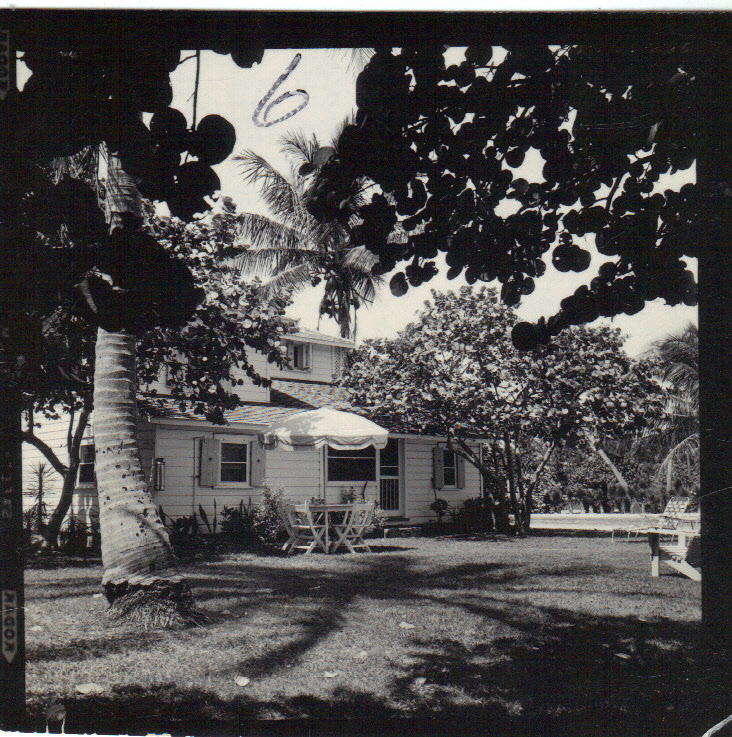
She had told me not to run with the lollipop in my mouth, but there I was, galloping my imaginary pony outside the cottage, sucking the sweet green candy and issuing riding commands. Then it slid into the back of my mouth and wedged inside my throat. My first memory of panicked bewilderment: the inability to swallow and blocked breath.
I knew to bang on the porch door off the kitchen. Lois came out, grabbed me by the ankles, and shook me up and down like a sack. The ground came close to my eyes, then fell away and then back until the white stick and glistening candy appeared on the spongy grass.
Bitter tears of fear and pain. A warm embrace.
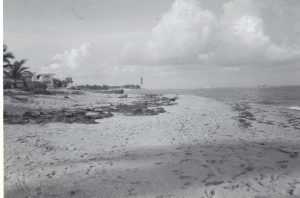
The boy and I were arguing while standing knee deep in the quiet shore water. He pushed me over backwards and jumped on my chest. His knees pressed on my torso and hands held down my arms. I saw bubbles rising to the surface, felt the salt stinging my eyes and water filling my nose. As I squirmed for freedom my back rubbed against the tentacles of a Portuguese Man of War. A surge of pain and desperation gave me the strength to push him off.
I fled along the path over the dune and across the common yard of the cottages to Lois.
My parents were “snowbirds” from Connecticut.
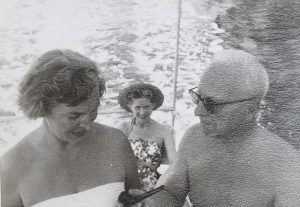
The cottage we lived in from early January to the middle of May was in Pompano Beach, Florida.
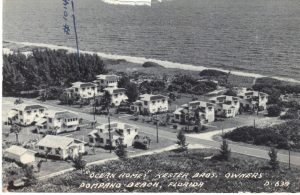
The real estate visionary and entrepreneur William L. Kester developed beachfront rental cottages in the 1930s between the coastal road A1A and the dunes, two story homes clustered around a common yard with shuffleboard court and banyan tree. During WW II the cottages were rented to servicemen. My mother was the first long term renter after the war and stipulated improvements be made to “our” cottage.
Other Kester residents were Midwesterners and fellow New Englanders, retired couples and Baby Boomer families.
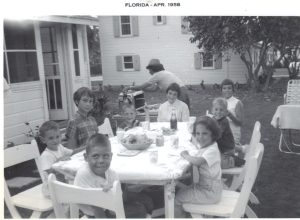
“The rental cottages along the beach provided steady employment
for several black residents of Pompano, whom Kester employed as gardeners,
handymen, and maids.”1
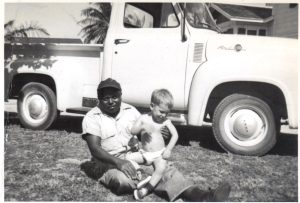
“Shorty” was the friendly man I remember and, according to my mother (in conversations decades later) the unofficial mayor of “Colored Town” who recommended the workers and maids Kester hired. He was a gardener too. After my parents moved north to Boca Raton, he paid us a yearly visit, bringing bushel baskets of fresh vegetables.
My mother also told me that in the evening she would lower the window shades to prevent police from inquiring if they saw a Black person inside. After sunset Black people weren’t allowed within a mile of the beach.
“Upon returning to the Union, Florida reverted to many of its antebellum institutions. Although slavery was abolished, new systems were put in place to maintain White Supremacy. The Poll Tax, White Primary, and segregation in public facilities prevailed.”2
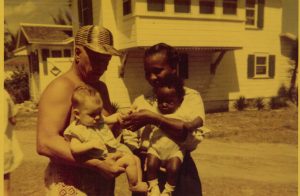
Johnny Rose is the woman in my earliest memories beside my own mother. She was married and sometimes brought her son Sterling to play with me (“Terling” I reportedly pronounced his name).
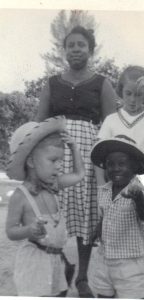
“They say I was too young
To remember Johnny Rose,
Couldn’t have been more than four,
But the first soulful tones
That I ever heard
Came on wings through the kitchen door.
She fed me and rocked me
That was her job,
Her son was the same age as me,
The one with the world
Reserved in advance
And her own who would fight to be free.
They say I was too young
To know that she drank
She was fired because she stole booze
She went into a hospital
And that’s all they know
But I remember Johnny singing,
Singing her blues”
Tico Vogt 1975
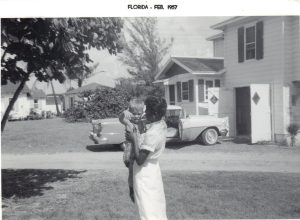
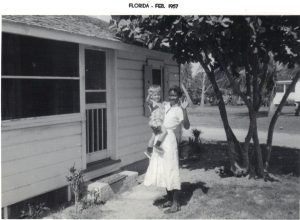
Lois was an unmarried woman in her twenties whom my mother hired as a daytime maid and someone to look after me, the youngest of her three children: Tina 1947, Toni 1948, and Tyke 1953. Her family would have lived on the west side of Pompano’s Wall of Segregation, the “five foot high wall built to separate the then, predominately white neighborhood of Kendall Green to the east from the black neighborhoods of Kendall Lake and Pine Tree Park to the west.”3
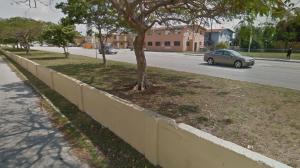
She likely had attended school less than 180 days a year because Black children had to work during farming season as Pompano was a busy truck farming hub that shipped winter produce to northern buyers on the Eastern Railroad. Fieldwork had to keep up with “the grueling demands of agriculture work, which started at sunup and ended at sundown for $1 to $1.50 per day. The only leisure time they had was attending church.” 4
How did I perceive her? She was a grown-up person full of lightness and joy, fun loving and caring. I played on the floor near her low-top white canvas sneakers as she stood at the ironing board, pretended to be locked up in chains in a dark dungeon and she’d save me, dressed up as cowboys with her in the yard.
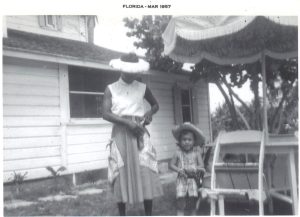
“You named her ‘Lovely’ Lois” my mother told me.
She accepted the offer to move up to Connecticut with us that May. How did she travel? Not in the family car. Train travel for African Americans was highly restrictive even after the 1955 ICC ruling ending segregation. Lois most likely traveled by bus, either to Bridgeport or to Norwalk.
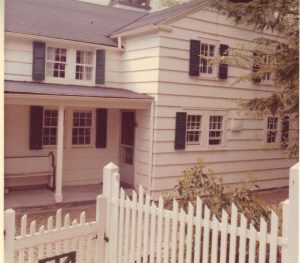
She had a tiny bedroom, a sitting room with a television, bookcase, chest of drawers, and chairs, and a bathroom with a tub. Its windows looked out onto a breezeway that connected the house and garage. A door in the kitchen accessed her apartment.
That July Lois, my parents, and I traveled to my sisters’ summer parent/camper weekend in Casco, Maine, a full day car trip. It would have been a long drive (before the Interstate highways) and typically a difficult one with my dad at the wheel. His attitude was that no one should be in front of him. He camped out in the left lane and invariably passed every vehicle, pulling stunts that caused my mother to shriek and beg him to slow down.
Lois and I, untethered by seat belts, somehow spent the day in the back seat, me with comic books and plastic army men, she with her bible. Outside the car windows passed Bridgeport, New London, and Providence. We stopped in Salem, Massachusetts to visit the Witch House where I put Lois in the stocks and pillories and we ventured into a spooky basement. Then the seacoast of New Hampshire, and late in the day, the lakes and pines of Maine. We arrived in time for dinner at the Edgewater Inn owned and run by Mr. and Mrs. Jacobsen, 1,200 miles north of Pompano Beach.
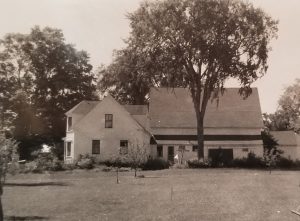
Lois and I made our way to a second-floor room stuffy with summer heat and the powerful fragrance of Pine-Sol.
Our hosts raised their own vegetables, berries, and chickens. The food was delicious, especially the blueberry pie à la mode.
The next day Mr. Jacobsen took Lois and me fishing in a small aluminum boat. No fish came to my line as we trawled the tea-colored lake, but Lois had the magic touch. She pulled in one silvery perch after another and smiled over my jealous grouchiness.
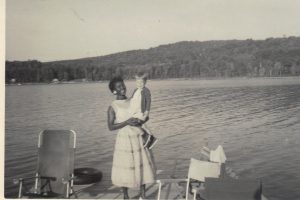
The picture of her holding me at the dock is my favorite. She’s wearing her own clothes with colorful patterns, not a maid’s outfit, and bold jewelry, smiling so beautifully.
In the village there was a small fair we walked to, stopping in the pharmacy to have ice cream or soda pop. There were the typical rides and activities. Did people react to seeing a Black woman?
That fall Tina and Toni were in elementary school and I began kindergarten. My dad drove over to his office in Westport every morning. The house must have been very quiet and a lonely place for Lois.
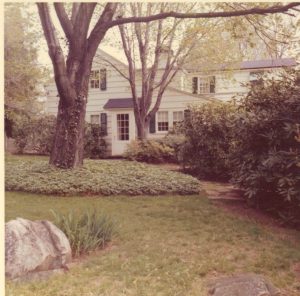
She would greet me at the bus stop and serve me a snack. If she went down to the basement laundry, I would find activities to be near her, poking around in cobwebbed corners, running my army soldiers through an old-fashioned hand wringer, playing with stuffed animals.
A regrettable memory is of being bathed by my mother and Lois. I asked Lois why her skin was a different color than mine. She explained that she had chocolate milk on her skin. I tried to rub her forearm “clean” and cried when it became obviously futile.
Sampson of the Old Testament was one of my first superheroes. His smiting of armies with the jawbone of an ass and pushing apart temple pillars were about the only Bible stories I warmed up to. The sketch of him in our family’s Daily Roman Missal was frustratingly minimal and disappointing. I shared with Lois my fascination about him, which led her to bring out her Holy Bible, a heavy leather-bound book with gilt edged pages. She opened it to a full glossy color depiction of Sampson fighting a lion. I was transfixed.
One afternoon while she was in another part of the house I gave into an irresistible urge and went into her bedroom, opened her Bible, and engrossed myself in the awe-inspiring image.
Her furious voice broke my spell: “Don’t you touch my Bible! That is MY book!”
There is one photograph of Lois during her time at our home, Sky Ridge. It was taken by the (since) famous married photographers Russell and Betty Kuhner. It was Betty who pioneered the “environmental portrait” that hoped to capture spontaneous joy and interaction among family members. In fact, there was no spontaneity. The proposed settings were ridiculously contrived, as when we siblings had to change into pajamas in the middle of the afternoon and pretend to be awaiting Santa Claus by the fireplace.
On this occasion I had to change out of play clothes and pretend to be at breakfast eating a bowl of Alpha- Bits with Lois watching me. Even as a four-year-old this seemed preposterous and, further, I wasn’t hungry. But come on and eat they said. I resisted their pressure and succumbed to angry tears. Then Lois humored me by arranging the letters into something funny that made me giggle. Snap went the camera.
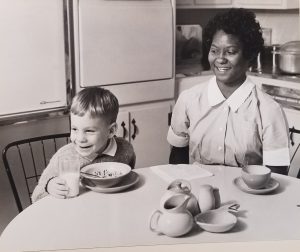
Her time off began Saturday after lunch. An unfamiliar car would pull into our driveway and Lois, walking across the brick patio and through a white picket gate, disappeared until Sunday evening. My mother explained that she stayed with church friends.
The name Rudolph entered my awareness as a person Lois visited during her time away. I had only heard the name as the famous Reindeer, and it mystified me that it could be a man’s name. It also made me feel jealous and frightened. Would Lois leave to marry him?
Then it was specifically Rudolph who picked her up and took her away.
Lois returned on a Sunday morning instead of the evening as usual. There was a sense of alarm. A cloud darkened her amiable disposition.
Sometime in December my mother told me that we were going to a courtroom with Lois to be her friend while a judge listened to her story. The man Rudolph had tried to do something to Lois, and she had smashed a glass bottle against his head to protect herself.
The courtroom seemed cavernous and cold. The polished benches of dark brown wood were mostly unoccupied. On the witness stand she was dressed in a tan camel hair coat and a tan pillbox hat.
She addressed the judge in serious tones. A bright light was focused on her.
Then Lois was gone.
*
“She said it was a good thing she should leave” my mother said decades later. “She described her affection for you as ‘unnatural.’”
My mother and I had many conversations about the early Pompano Years. What she didn’t tell me was that she had well organized black and white snapshot photos in large envelopes filed as “Kesters” and “Pompano Beach”. The only picture of Lois that I had been aware of was the Apha-Bits one. These envelopes weren’t revealed until after my mother died. What a flood of memories they released. Eventually I combed through all the address books, letters, and correspondences that she had meticulously saved. Lois’ name came up in a few letters my grandmother wrote to my mother, but no last name was ever given.
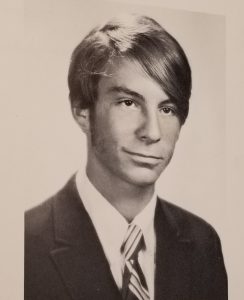
Spring of 1971. My senior year at St. Andrews Episcopal School for Boys. Deep in a late afternoon nap at my parent’ home in Boca Raton.
“Dear, wake up. There’s someone here to see you.”
Someone to see me? I had no plans for any friends to come over, and in our gated community no one just showed up.
In a disgruntled fog I made my way across the wall to wall carpeting toward the muffled voices in the living room.
There was Lois. She was dressed in a denim suit with high black leather boots and large earrings. Her radiant smile.
It was an occasion I couldn’t cope with, standing mute while my mother repeated what Lois had been telling her about her life, that she was a minister of her own church. They continued to talk while I endured complete awkwardness. Lois gave me short glances, perhaps understanding my befuddled, paralyzed state. I watched her head to the front door and turn around for a last smile, missing my chance of a lifetime to say, “I love you, Lois.”
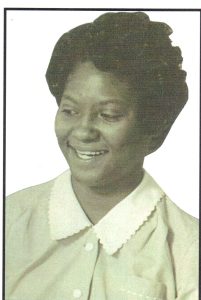
1 Pompano Beach Historic Sites Survey City of Pompano Beach Broward County, Florida 4-13
2 Frank J. Cavaioli PhD. “Pompano Beach: A History” History Press p.17
3 Kevin G. “The (Segregation) Walls That Divide Us” metroatlantic.wordpress.com May 2013
4 Cavaioli p.40

My first experience with claustrophobia was in a hotel room in Florence, Italy. I was eleven. My parents and sisters had left the hotel for a few hours in the afternoon, and I was enjoying time alone with comic books, away from lines of tourists at churches and museums. When I needed to use the bathroom, I engaged the rusty door lock just to be sure a cleaning maid didn’t walk in on me. It gave a disgruntled “clunk” on being turned. A few minutes later I went to open it and found it fixed in the locked position. With that awareness the room emptied of air and suffocation felt inevitable.
I turned around to see myself in the vanity mirror. I appeared green and the room light was dimming. Being barefoot and with only underwear on added to my sense of vulnerability.
I pounded on the door and yelled, using up the precious oxygen remaining.
The small window set in the door with cloudy glass and crisscrossed wires running through it was the only exit possible. I grabbed my sister’s hairbrush and with my waning breath attacked the glass, creating cracks and breaks and shards that I pulled away from the wires and the lower edge of the window frame until there was an opening. I turned the waste basket upside down and stood on it, assumed a diving pose, placed my hands and arms through the jagged opening and sprang off the waste basket. My stomach scraped against the bottom of the frame and my body stopped its forward motion.
A maid happened into the room a few minutes later to find the naked torso of a Bambino americano flailing in the door window.
*
They weren’t too picky about talent at Hoffman’s Carwash and Service. I deduced that while waiting in the customer lounge for a basic oil and lube service. A tremendous screech and shudder went through the building when a mechanic backed a car out through a closed overhead door.
An automatic carwash though?
On an overcast fall afternoon, I pulled in line for my vehicle’s long overdue removal of mud and bird poop. My turn came and I rolled down the window and told the attendant “Just the basic wash and rinse, no wax or extra undercarriage cleaning.” He waved my front tires onto the tracks, lowered the antenna, and my car and I were at the mercy of the conveyor. No radio and prior to owning a cell phone.
Out came the high-pressure hoses to work their magic. The car was soon fully pre-soaked, and I expected to roll towards the next station, only the car didn’t move. Zero visibility out the windows and the noise of powered spray on metal and glass. Dang, such an inopportune moment to have to urinate.
Minutes and minutes passed. What the hell was going on?
Through the side mirror there were glimpses of a figure standing in the carwash entrance behind me waving arms. Then there was no car in line behind him. Then there was an orange traffic safety cone.
Brief shouts. The indistinct shape of a figure running along the interior wall past me. More shouting. No way to call out with the sprays trained on me.
The car lurched forward and a moment of clarity before the brush and cloth treatment. An assistant carrying a wrench the size of his leg disappeared into the miasma. I opened my window to yell for someone, but a “clunk” of the rollers propelled us into the long fabric strips and whirling brushes. Beyond the swirling activity there was a hinged door on the floor where someone descended on a ladder. Then suds and foam and we stopped again. Slop, slop, whirl, thud, slop, slop, whirl, thud, again and again.
My bladder felt critically compromised. My heart stampeded. Asphyxiation loomed.
“Clunk.” Another short lurch that landed us in a gap between the brushes and the rinse cycle. A worker ran up to my window and knocked. As it was opening and before I could yell “Stop this fucking thing and let me out!” he stuffed a fistful of papers in my lap and ran off. Messages explaining the situation? Free carwash coupons!
Another jolt advanced us into rinse territory, and I allowed myself a glimmer of hope that deliverance was nigh. In a few yards the rollers stopped again in the middle of the air blast cycle. Now I could see two guys next to the wall looking over at me and making hand gestures. They left. I waited. And waited. And waited. The blower jets howled against the car doors. No possibility of escape. Anger had been held reasonably in check up to this point, but now a hot wave began spreading from my toes upward.
The two guys reappeared and marched over as close as they could and yelled something. I lowered the window a crack and got a blast of air in my face.
“Turn your wheel hard to the left and gun it!”
After several repetitions and me screaming it back for confirmation I turned the steering wheel hard to the left, shifted the transmission out of neutral and into drive, pushed down on the accelerator and shot ahead. Both left side tires rode up along the top edge of a guard rail, slipped over, and ground to rest on the control arms leaving the car resting at a 30° angle.
I climbed out the door window.

I had an hour to kill at lunchtime in Fort Edward, a small city on the eastern shore of the Hudson River, and I thought to give an Irish pub a try. Burgoyne Avenue is named for the British general who passed through in October 1777 on his way to eventual defeat at the “Turning Point” Battle of Saratoga.
The atmosphere was subdued, with Jimi Hendrix, Neil Young, and Cream music playing at a modest volume, and muted screens showing hockey. Along the bar was a trucker, who chatted with the bar owner about the six point buck he’d bagged in just twenty minutes, an old couple, he with a cap festooned with American flag buttons, and a ruddy faced middle aged attorney.
It was the lawyer who issued the salvo, first by stating he’d lived in NYC for 24 years. His pronouncements were cheerfully acknowledged and supported by the others.
– The recently elected mayor of NYC should (and will eventually) crawl back in his hole.
– The best thing that ever happened to the city was Rudolph Giuliani, who put a cop on every corner and established the NYPD’s Stop-And-Frisk policy. Any protests and- crack, crack, crack (heads being clubbed). Ha ha!
– That poor 17 year old kid in Wisconsin…
– Nobody’ safe because of the new bail reform laws, and, what’s more, six facilities in the NY prison system will close. The governor and those jackasses…
– He and the homeowners on his street in Kingsbury are well prepared. The stock pile of ammo they have, the number of rounds, was in the thousands.
The beer and sandwich were good, but left unfinished.
The purpose of the Smarter Sawbuck from Vogt Toolworks is to cut firewood to uniform lengths without measuring, making the process convenient and efficient. Its ergonomic design with open bays allows the operator to stand in close without leaning, adding to safety and comfort.
Set an end of the log or pole flush with the left end of the sawbuck. Align the face of the sprocket cover with the face of the leg leaning toward the operator and saw, working from right to left (long to short). The sawed pieces lay conveniently on the top rails for easy handling. Small diameter sticks fall into the bays. It gives support to long poles, perfect for woodlot owners thinning tree stands. The Smarter Buck is designed to cut on 16” centers but can be easily modified to other lengths and made shorter by omitting X-Brace sections.
The Smarter Sawbuck is sturdy, easy to move (36 lbs, made of rot-resistant and easily obtainable Cedar decking), efficient and ergonomic: a fundamental companion to the operation of firewood processing. An 8’ piece can be cut to equal lengths without needing to move it during sawing.
The detailed step-by-step instructions in the guide are accompanied by more than 24 illustrations and measured drawings, and almost 40 photos. You’ll pick up plenty of good woodworking tips and end up with a valuable aid to building your woodpile. It’s also a great build for woodworking schools, clubs, and DIY groups.
Please visit: https://smarterxbuck.com/

In the year since the mass outrage committed at the Stoneman Douglas School, the question has loomed large in my mind of how hatred forms, why it underpins so much of human existence, why we repeatedly are unable to take stock of its presence, our choosing, or not, to educate ourselves to contend with it, and what means we have to contribute a course away from it.

The surviving students took direct actions in the aftermath: school walkouts, marches, voter rallies, actions that have claimed the world’s attention and shaken up politicians and lobbyists.
“The courage and determination of these young survivors is a testament to the human spirit, and a marvelous inspiration to all of us, to fight for what is right, and not to give in to pessimism. “ PT, Melbourne, FL, NYT .
Fifteen miles away from that campus is St. Andrew’s School which I attended from 1967-71, at the time an all boy private Episcopal preparatory boarding and day school grades 7-12 located on rural land west of the city of Boca Raton.

The class of ’71 stands low on a curve that anthropologist Robert Putnam used to determine “social capital” and civic engagement. I have long noticed that names of my high school (and college) class members occupy little ink in the alumni news and on the lists of donors. We represent the trend of decreasing hands-on participation in, and affiliation with, religion, civic, fraternal, and parent-teacher organizations.
What was it that we wanted to turn away from and why? What was it we wanted to turn towards? At the end of our four years of highly regimented schooling, a tumultuous era of political assassinations, war resistance, human rights struggles and cultural upheaval – did we have any positive impact?
By our senior year I think we did make some positive contributions. Nothing earth shattering or headline claiming, small gestures at best, but one in particular stands out to me as significant. It represented a growth of awareness in us, and it had come hard won. After four years of bewildering pressures and expectations, we made a collective decision.
August 1967
As a new student entering the Third Form (9th grade) I was required to arrive in the morning, a Saturday, before the older returning students and the younger ones from Forms 1 and 2 (7th and 8th grade “Weenies”). The roommate assigned to me was one. I donned my tie and blazer and made the campus rounds with my father, walking on the sidewalks between buildings because grass walking was strictly a privilege of faculty and seniors. It was a blazing hot morning and we were both sweating by the end of a long loop from my dormitory around the pond, the quad, the academic buildings, library, dining hall, other dormitories, to the Chapel, the pool and gymnasium, post office, bookstore, and back.

After my dad departed I sat for awhile on the edge of my bed, taking in the cinder block walls, the two particleboard desks and closets, listening to the air conditioning hum. I had failed to be admitted to the traditional northeastern prep schools, and this place, being a fairly new school with less competitive admissions, had accepted me.
My parents likely felt that public school wouldn’t provide me with the horizons they expected for me, or the character building discipline. I would soon come to understand a spectrum of motives for kids to be sent away there; icy cold parent/child disaffection, class aspiration, behavioral correction, divorce, and in one shocking case, the sudden death of both parents in a plane crash.
The school property was physically remote, set in the palmetto scrub lands away from roads and neighborhoods and famously chosen by NFL teams as a spy-proof practice location prior to the Super Bowl. It was its own universe.
My first foray was a walk down the hall to try to meet any fellow students who had arrived early. A light shone from one of the rooms into the dark hallway. I walked to the doorway, glanced in, and saw a boy standing in the middle of the room. His hair had been recently cut very short, obvious because of the white untanned skin at the edges of his scalp. His demeanor was not friendly, so I passed on.
“Hey kid, come here.” I back tracked and stepped into the room hesitantly. “Come here.” I obeyed and then got sucker punched in the face. “Don’t try to mess with me, kid.” This boy had spent the previous two years at a Florida military academy. One of the disciplinary measures he’d had to endure was to stand at full attention in a hot room with a single light bulb, dressed in full cadet attire, and wait until his perspiration condensed on the ceiling.
The short haircut had to do with his signing up for the football team. Sunday night was a school-wide pep rally at which a straw stuffed effigy outfitted with the jersey of the chief rival school in Ft. Lauderdale was lynched and burned.

My next meeting with fellow students was with a group of four African-American freshmen standing on the sidewalk in front of the dorm. I can look back now and see what an important moment it was. Jim Crow laws had ended only three years before with passage of the Civil Rights Act. A prominent member of the Board of Trustees (a two-time mayor of the city and staunch segregationist) had strongly opposed the decision to allow black students to enter in 1967. He withdrew his son and enrolled him in the rival school.
“… funded by a private organization called the Stouffer Foundation, to instill in Southern white elites a value then broadly absent: a visceral and compelling belief in the societal benefits of integration… That same fall, four other Stouffer students broke the racial barrier at Saint Andrew’s School in Boca Raton, Fla. The privately financed experiment would become a turning point in elite high school education in the South, and it would test, in very real terms, how much a black child could achieve in a white environment and the price he would have to pay… In the years after Brown v. Board of Education, new private schools popped up around the South, and older private schools expanded enrollment. The schools gave such reasons for their growth as “quality education,” “Christian atmosphere,” “discipline” and “college preparation,” but mostly they were academies with nostalgia for the Jim Crow South, schools to which white families fled in order to avoid integrated public schools. ” (Mosi Secret NYT)

That afternoon the returning students arrived. There were some friendly faces, kids happy to share with the new classmates how to game the system. For instance, at “lights out” at night all room electronics had to stop. One kid showed me how to rig up a wire connection in the doorway such that when the door opened (by our hall “Monitor” trying to catch us) all the lights and stereo equipment shut off.
Others exhibited wariness toward the new and untested. They weren’t going to grant membership status so easily. Their concerns were with the pecking order that would change with moving up from “Weenies” to Third Form, with the establishment of a new crop of seniors, with how the summer had played out in the cases of particular individuals who, for mysterious reasons, had not wanted to go home. It was typical of them to talk with their mates in front us, dropping names with knowing smirks and chuckles. They would be the ones to administer hazing, by attitude or action.
Still others kept quiet and went about their business while bottling their dread stoically.
A world of bells, minutes, and deference.
A fundamental life change set in with the ringing of the chapel bell on the quarter hour, beginning at dawn, the electronic peeling that echoed over the pond, penetrated buildings, and spread across athletic fields. Church bells, factory whistles, alarm clocks, and the school hallway bells of junior high were familiar to me, but they existed in independent realms of my life, never an inescapable constant.

There were hallway and corridor bells, too, that rang with a metallic, aggressive tone against the hard surfaces. Lunch and dinner meals came to order when the chaplain rang a hand bell before prayer.
From Rising Bell until Lights Out Bell every minute of one’s day fit into packaging of fifteen minute multiples.

I remember walking on the sidewalk between classes with an intellectual whiz kid who entered sophomore year. He stopped and commented angrily “We’re Pavlov’s Dogs here. I won’t stand for a life like this.” He didn’t.
Breakfast, room cleaning, mandatory Chapel, classes and study hall periods, lunch, classes and study hall periods, athletics, dinner, study hall, a short bathroom/shower break and then lights out.
Saturday was a school day through lunch. A high Episcopal mass was held on Sunday evening after the dinner meal. As a Roman Catholic, Sunday morning, which could have been the one time to sleep in, was denied me and I went in a van to mass in the city (the double dose of Christianity still wasn’t enough to convince me).
Students prepared tables, served, and cleaned up after lunch and dinner. A faculty member and his family sat at each table for every meal.
Deference toward faculty and their families was, of course, a given. The moral value of obedience to one’s seniors was a core belief. Senior classmen, like faculty, were also accorded positions of authority, advantage, and privilege over the younger forms and were expected to receive proper respect. They could walk on the grass, butt to the head of any line, were granted much greater opportunity to leave the campus, and were selected as various Monitors. The “coup de grace” of their life at the top was the “Hour” system of punishment.
Book of hours.
Faculty and seniors could assign work hours to underclassmen for any infractions of the rules they witnessed. A list of work hours representing the tallied offenses would be posted by Friday afternoon on the central bulletin board along with the current academic standing of each student. One’s scholastic achievement and personal behavior were matters of pubic record, as if constant physical scrutiny weren’t sufficient.

The Hour List showed names and the number of hours the student had to work off over the course of the only free time that existed: Saturday afternoon and Sunday before dinner and Vespers. Clearing the drainage ditches along the campus property lines, cleaning windows, polishing trophies, raking, and sweeping were typical work assignments.

Seniors could devise their own work duties for individuals, thus making the punishment a personal matter, and were given the power to arbitrarily determine the required number of hours. Their much coveted privilege of walking on the grass was protected by this system.

They could make the underclassmen clean their room, shine their shoes, or wash their car.
A select number of seniors and juniors were appointed Hall Monitors, Dining Room, Work Squad and Chapel Monitors. The Chapel Monitor, positioned in the choir loft, scanned the pews for any kids succumbing to drowsiness and nodding off during the service, an offense that would cost them in hours.
“Monitors do the jobs around campus that allow Saint Andrew’s to function smoothly and efficiently without constant faculty supervision.”
For some students the hour list posted on Friday indicated that there would be no free time over the weekend. For some the number of hours would spill over to the following week. There were boys who could never catch up and developed a fatalistic, badge of honor reputation for being incorrigible.
Seniors expected to be the lords of their underclassmen. What had been meted out to them they in turn looked forward to meting out, part of a cycle of dominance that made school feel like a penal colony.
“Muscular Christianity”
Trying out for a sports team was mandatory. Failing a spot on junior varsity or varsity would put you on the “goon squad” doing calisthenics, a necessary testosterone burning activity but essentially of rock bottom status in the hierarchy of male identity.
Top status went unquestionably to the football players.

There were faculty members who were primarily football coaches but posed as teachers. In fact, all sports had teacher/coaches, another forced mentoring situation beyond the classroom and dinner table. Football had a primacy against which all other activities and accomplishments were compared. Students had to measure up against each other in their respective sports, but also against the venerated gods of the gridiron.
Athletic activity wasn’t presented as a healthy habit to be pursued over a lifetime. It was about dominance, power, and status.
Abuse
In the caldron of repression that was school life, of young men jockeying to establish their masculinity, conflicts over race, entitled social hierarchy based on family wealth, northern versus southern political views, religion, all mixed in with personal antagonisms. The underlying violent emotions and energy could be channeled into sports, it was thought, and assuaged by the constant message of faithfulness and obedience to God. As if resentments could be so easily contained.
Given the perpetual competition, ceaseless scrutiny, vying for status, demanding scholarship, disciplinary control and punishment, lack of free time for self-reflection and examination, and a dearth of nurturing, it comes as no surprise that abuse was rampant. Over the course of my four years I witnessed the major brands of abuse, faculty to student and student to student. I am not surprised to read of recent scandals rocking the school, only surprised that it has taken this long for abuses of authority to emerge in public view.
A certain amount of rough and tumble, callous behavior is “normal” with boys and young men, I’ll grant. Bringing things to a personal level, the following are not examples of the abuse I witnessed (those stories are for others to tell) just mindless and casual pranks, but they left strong impressions on my psyche.
~ My Hall Monitor ganged up on me with the aid of others, dragged me to his room, shoved my head against the rug, and administered a rug burn on one half of my face. Then I was flipped over, my shirt pulled up and a tennis racket pressed against my stomach. The protruding flesh was whacked with a wire brush and then after shave was applied.
~ While taking a shower before lights out, standing in an open stall, a boy rushed in and dumped a pail of scalding water on me.
~ Three kids jumped me and pulled me into one of their rooms, lifted me up, shoved and crammed me into the small locker with sliding panels above the closet, then slid the door closed and put a stick to prevent it from being opened. They proceeded to pound against the doors with broom handles and to spray aerosol cans through the spaces around the edges of the doors, poisoning what little air there was to breathe. It’s the closest I have come to losing my mind.
“Boarding school is a distinctly perverse and alienating experience. I can say that with authority, because I spent four years at one, and on good days I still manage to convince myself I emerged the better for it.
The hard part isn’t being away from home, it’s confinement among one’s peers in one of the most high-pressure settings one is ever likely to experience… Other boys and girls go home at the end of the day or disappear into the streets… but in boarding school there’s no privacy, no money, and no help, except from the larger family of the school itself. There’s no dreamy solitude, no slack time, no lazing around. One’s entire life is spent in public, performing.” Nelson Aldrich Jr.
The “larger family of the school” offered : Vestry, Acolytes, Student Council, Key Club, Gun Club, Varsity Club, Choir, Spanish and French Clubs, Dramatics, and Yearbook. A surfeit of civilizing activities, but, in the end, brutally inadequate.

“The System” was an amorphous term in much use in those days by leaders of the counterculture and underground movements. The System, or the Establishment, sent young men to kill and die in Southeast Asia and police to brutalize and sometimes kill people in civil rights and peace demonstrations. It was aligned with the military/industrial complex and thrived on the nuclear arms race. It was a vague controlling authority that demanded conformity in a dull 9-5 work world.
There was nothing vague about the intransigent authority that we students strained against. The System in place was a clearly structured and defined entity. We could make modest proposals through student government. Small concessions were made to our requests about liberalizing the very strict dress code and hair length rules, but more important change felt essential.

Me standing.
Senior Year 1970-71. Pushing back.
Our one group protest moment came when a favorite faculty member, one of the few we felt was on “our side,” was disappeared, moved off campus in the middle of the night. The following morning all questions regarding what happened to him and the reasons for his removal met with stone silence. Not one word of explanation came forth. We staged a morning walk-out of classes.

“Sir, a group of us would like to form a club to do Yoga in the afternoon instead of sports or Bod Squad. Doug Rill has studied it and is willing to be our teacher.”
I was sitting in the office of the Athletic Director and head football coach.
“Vogt, Yoga? That’s something you eat!” I went on to explain the stretching, poses, and meditation we would be practicing. To our surprise, the proposal was accepted. We were accorded a grass area in plain view of the football fields. Faculty spies with binoculars were regularly spotted observing us. Drug use was their primary suspicion.

Those afternoons spent focusing on breathing, gentle stretching, relaxation, and meditation techniques taught me life long skills. They helped me to let go of stress. By the end of a session I would begin to hear the birds, feel the warm rays of the sun, the spongy grass, inhale the scents of pines, palms, and flowering shrubs, enjoy a loose body and a calm mind. They were the most peaceful and meaningful times of my school experience. A shout out here to Doug (the same kid who taught me the door wire trick freshman year!): you did a remarkable job as our instructor.
Another group of seniors proposed and were permitted to form the “Varsity” Gardening Club as an alternative to sports. They were allotted a small plot to dig up and cultivate. The produce was donated to the Children’s Ward of the local hospital.


The Stouffer scholarship students capped off their impressive four years with the formation of the Black Liberties Union. The number of black students had grown with each following class. They created and performed in the Chapel a powerful Black Pride production with their own music and choreography.

It was uplifting, not only seeing a creative and well done piece, but to witness their success as individuals and young men in solidarity. Under the weight of huge responsibility and adversity, they had made the school a better place.
WASP assumptions were affronted by our graduating class: its top achievers were the minority Jewish and African American students.
Renouncing privilege.
The alternatives to sports and the expansion of clubs that we initiated were our way of combating pessimism, our struggle to break the mold. I think they were creative responses.
We, as a class, went a step further by voting to end our privilege to discipline underclassmen using the hour demerit system.

Not all privilege is worth having. The health and well being of the community trumps the right to individual power. We felt a responsibility to change an abusive system and this was our small contribution.
“For in truth, there were two revolutions in that tumultuous decade. One involved stretching the boundaries of personal freedom; the other focused on the limits of freedom, on what individuals, and governments, could not do: oppress racial and sexual minorities, dump poisons into the air and water, and wage endless war based on lies.
It’s not surprising that the second revolution has been less successful — it is always easier for human beings to indulge and rationalize their impulses than to say no — but it is by no means over.” Philip Barroll
What else but cultivating restraint can change the fatal course of homo sapiens? To decide that temporary power, convenience, and gain must give way to long term considerations is a conscious act of renunciation. It’s not something they teach you in school.
 Me seated center
One afternoon in the spring of 1970 a friend and I had an experience on the Hillsboro Canal in south eastern Florida which I have never forgotten. In my family’s Boston Whaler I used to take friends swimming and water skiing on the straight section below the final lock, or water control structure.

At that time it was a remote looking stretch of undeveloped land and brackish water with only two breaks in the vegetation along the Deerfield Beach shoreline: a former WWII barracks occupied by African-American families, and a modern house a half mile farther westward with heavily built pens containing large African cats that got riled up when we went by and threw themselves against the wire fencing. The shore area there was rip-rapped to prevent boat landing. Rumor was it was property owned by a wealthy drug dealer.
This was a favorite waterway for kids with access to boats because it was a wild landscape, something out of a Tarzan movie. A description given by early settlers of the original fresh water stream that was the Hillsboro River “the banks of the river were covered with dense vines and saw palmettos. It was shaded by wild fig trees, cabbage palms and stands of pine trees” could well have described our perceptions of the canal.

(3)

(2)
The lock station looked abandoned with no one ever seen manning the facility. From a heavy rusted cable high above the water a cable car swung freely. We made it travel from bank to bank with ropes. It served as a diving platform at mid span.
“This particular spillway was one of the first water control devices built in South Florida. Originally called the Deerfield Locks, it was a true lock structure used to get cargo and vegetable barges from Lake Okeechobee to supply the eastern communities or rail shipment to the north. This was in the early 1900s.” (1)

There was regular boating and fishing activity on weekends but quiet most other times.
On this particular weekday afternoon I took a friend out there, a fellow high school junior from St. Andrews School. We both enjoyed undeveloped places. A swim and a hike around the wild land was what we had in mind. I parked the boat up on the sandy south bank a hundred yards from the lock and we began swimming across to the opposite shore. Not a long hike because we were barefoot and without shirts.
It was late in the afternoon, the low sun casting shadows from the lock’s spillway, darkening the warm and silty water, our swimming pace easy and comfortable. Of a sudden I sensed commotion, of water being slapped, and looked over at Charley. He was in a state of panic. His lanky limbs were making wild arcs, his eyes wide open and rolling in terror. I called to him asking what the matter was but he kept flailing away with all his might for the shore.
My quick appraisal told me that he was moving, not drowning, and that gave me the go ahead to do likewise. Of the two of us I was the far more experienced swimmer, but he reached the shore at the same time I did. He dragged himself onto the beach and collapsed. I looked him over and could see no signs of injury, spasming, or cramping, just an exhausted and trembling person who moments before had been relaxed and enjoying himself.
“Charley, man, what’s the mater?’
He said nothing because he was gasping for air, face down on the sand, too weak to lift his head. Eventually a shaking arm pointed to the canal. Looking out at the water I saw nothing unusual, just still water the color of dark tea. I looked at him, looked back at the water, and back at him again. It was beyond me to understand what he meant until I looked once more at the canal. Twenty feet away, the water surface was quietly broken by a jagged line of something rising from beneath and moving slowly parallel to the shore. The full head of a large alligator, then the plates on its back, and then the tail appeared. It swam by for several yards until submerging as noiselessly as it had surfaced.
What occurred during our swim to the opposite shore was that Charley had felt the animals’ back scraping against his stomach and chest.
I was stunned. Would the animal take an interest in us and come ashore? I knew they were capable of moving quickly on land. As soon as he could get his legs under him, Charley and I walked into the brush.
The heat of the afternoon was gone, the sun was setting, and something unexpected materialized: mosquitoes. Big ones that delivered a bite like a hypodermic needle. Voracious and aggressive. Not just one buzzing here and there but a swarm. We couldn’t swat them away fast enough. We tried moving off but the brush needed to be pushed away with hands and arms, which meant being bitten even more. They overwhelmed us. The only chance of getting away was… the water. A hundred feet across the canal beckoned the boat. And lurking in the water was… the alligator.
I can’t recall discussing what we would do. We mutually decided that to chance being eaten in a few minutes was better than to be bitten to death now.
So began an unforgettable plunge into dark water that has haunted my dreams ever since. Should I swim fast or slowly and calmly? If it came for me would it approach from the surface or lunge at me from beneath and chomp on my torso? I used the breaststroke and didn’t allow my legs to dangle. My appendages felt particularly vulnerable.
Five years later when I heard John William’s haunting theme music for the movie ‘Jaws”, the “duunnn dunnn” sound of a heartbeat pounding in terror, that swim on the Hillsboro Canal came back to me in full force. The emotion is still there, moving around in the murky depths.
Post Script.
In the almost half century since this incident, development has washed over that area. There is nothing remote about it now.

There are still the beautiful bends where the straight section coming from Lake Okeechobee joins the original Hillsboro River.

(3)

I contacted Charley a while back to see if he recalled this moment. “Yes, and I remember a lot of other things, too. Those were crazy times!”
1- http://pbchistory.blogspot.com/2017/11/a-history-of-hillsboro-river-and-canal.html
2- http://www.deerfieldbeachhistoricalsociety.com/52-3/
3- https://en.wikipedia.org/wiki/Hillsborough_River_(Florida)
A subtopic under the generally sore topic of immigration in the United States is the phenomenon of Third Generation Decline. We may like to believe that progress is continual for Americans beginning with the first generation of immigrants, but that is myth. The proof on the ground points in the opposite direction: “By the third generation, families absorb American cultural values, lose the feverish immigrant zeal to succeed and cease being, in any real sense, immigrants at all.” (Ryan Park)
I submit a first person account. My grandfather’s family emigrated from Germany in the 1850s. Adam Vogt was a successful jeweler, manufacturer, realtor and “notable man” in Louisville, Kentucky.

His first son, my father Clarence W. Vogt, was a prolific inventor whose innovations revolutionized refrigeration and packaging. He was a decorated officer in both world wars.

Now consider Adam Vogt’s youngest grandchild, born 99 years after his parents departed Freinsheim, Germany, for America. Well, uh, errr…


This 2.5″ x 4.5″ memo came to my attention years after my father’s passing. It is a record of jokes and punch lines that he kept during his time as a colonel at the Pentagon in WWII. Some of the entries are complete and easy to follow, while others are sloppy fragments, things I imagine him hearing at highly fueled Washington officers’ parties and jotting down in haste. Some ramble over several pages. Most are indecipherable.
 My father is in the middle of the three colonels.
This little volume is dear to me. It recalls so much about him, from the bizarre penmanship to his obnoxious habit of keeping a large and noticeable tally at my sisters’ camp and high school award ceremonies: see how many prizes my daughter(s) got? It recalls the morning newspaper where he would first go to the short “Daily Chuckle”, circle it, and cut it out to be stored in his wallet or desk drawer. He had little talent as a joke teller or humorist but he loved humor. Simple, direct, silly, and often repeated worked for him.
He would resort to the memo in a time of desperation, as will be seen.
Let’s open to a place with three of the four being legible jottings:

“Lindberg flew Atlantic. That was nothing. Think what his chances might have been if he’d had to have prior approval of a committee.”
“A corn is a corn but a pea is a relief.”
“Def. of a ‘fairy”: a boy who likes his vice, versa.”
Nothing terribly naughty here (considering the era) with the exception of the gay reference. There are a few others in that category:
“3 pills. 1st pill cures asthma. 2nd pill makes toothache. 3rd pill cures toothache, gives asthma.”
“Horse sense: a stable instinct.”
“General laid up. What’s the trouble? Things in General.”
When I discovered this diary my mother informed me of the truly hilarious part of its history.
My parents met in a Pentagon carpool. He was twenty five years her senior, twice divorced, and Lutheran (hardly). My mother, whose parents were his contemporaries, was Roman Catholic. Her mother, an imposing matriarch, particularly objected to my father’s marriage proposal.

“Why should I consider letting you marry my daughter?” she asked when he had finally summoned the courage to confront her.
“Because I can provide for her, Madam.”
“There are jails for those who don’t.”
With this high tension surrounding them, the great first dinner with his proposed in-laws took place. According to my mother it was a nerve wracking evening. My grandparents were stone cold silent and my father a nervous wreck, unable to break the ice and create a good impression. It was then that inspiration struck him and he reached into his coat pocket and pulled out his joke book. His nervousness was such that he was too impatient to read the jokes properly and mostly sputtered out the punch lines. There being only hostile silence he began to choke, but kept trying to read more! I wonder which of the following he chose:
“2 Admirals comparing notes- most embarrassing moment- when mother found me playing with myself. Oh, all kids do that! Yes, but this was yesterday.”
“Secty reported for duty- couldn’t take shorthand or type. Why were you fired? I can’t conceive!”
“Businessman had terrible thing happen- his business fell off.”
“Sailor named Practice. Wave named Perfect.”
“Niece with doting uncle- “Oh uncle I’m in terrible trouble. What trouble? (hard of hearing) I’m in a family way. Think nothing of it dear- when you’re as old as I am you’ll be in everybody’s way.”
“Girl walking in garden heard a cry for help- looked down, saw frog- frog pleaded with girl to take him home and put him on pillow + he would turn into a handsome prince- Girl did and sure enough, next morning there was a handsome prince beside her. Do you believe this story? Neither did the gal’s ma.”
“Madame fired one of girls. She couldn’t get her to remember customers always come first.”
“Why old maid only has 7 buttons- cause she can’t fasten eight!”
“Salesman hits farmhouse- can only stay with son- son kneels down at foot of bed- man- ashamed, does likewise. Hey, the pot’s on this side- Mom’ll raise hell!”
“Pessimist- man who has reached that stage in life where everything he liked to do was either illegal, immoral, or fattening.”
“Moron woke up. It was so nice out he left it out all day.”
“Woman hunter shot two monkeys, took them to have them stuffed. Taxidermist- “You want them mounted?” “No, just shaking hands.”
“Hear about the pregnant sailor? Phone operator reversed the charge.”
”There was a young girl from Detroit whose screwing was very adroit. She could bring her vagina to pinpoint or fina or open it up like a quoit.”
“Australian limerick: A soldier named Hubbard went to the cupboard to get himself a hanky, when he got there the cupboard was bare, and so was his wife with a Yankee.”
“Soldier ask taxi driver to get him home fast to get with his wife. Didn’t you get any girls overseas? I waxed it and waved it and nursed it and now I want it to have an honorable discharge.”
“There was a young lady named Gladys who had a most beautiful ass. It was not round and pink as you’d naturally think, it was brown, had long ears and ate grass.”
“Def. of a nurse’s aid- a nurse who can make the patient without disturbing the bed.”
“Man takes his girl to a pawn shop. Why? He wants to get her a loan.”
“How to avoid preg: take glass of orange juice. Before or after? Instead!”
Thanks for not avoiding pregnancy, folks!

Got pets and need to trap mice in your house?
Dog-friendly, less mess and cleanup, more efficient, the Mousieleum is a better mouse trapping environment. Read about it here.

The first blog entry about my father’s inventing career (September 2011) was titled “Covington, Kentucky, A Family Mystery.” (Click here to read it.) My sister, Sarah Vogt, and I were beginning to document the timeline of his personal and professional life. His scrap book from high school, college, and three years following had recently been sent to me by my (now late) half sister, Emily Postma. There were no clarifying remarks or dates on the photos, and they weren’t necessarily in chronological order. There was a letter of introduction to a bank in England and a photo of him (on the right) sitting with an unknown gentleman.

The post raised a question as to why he was making a transatlantic voyage in 1914- was it specific to his delay detonation device for missiles (click here to read about it), a topic also being researched?
The story has since been filled in and this post is an update. The military patent came later, and this trip was to advance his knowledge of refrigeration, with visits to refrigerating manufacturers (presumably) in France and Germany.
From a publication called “Ice and Refrigeration” under the heading “Frigerous Particulars” (August 1914) was this announcement:
“Clarence W. Vogt, of the Henry Vogt Machine Company, Louisville, KY, sailed July 13 on the S.S. New Amsterdam to visit the various icemaking and refrigerating plants in Europe.”
Little did he know how short- lived his visit would be, and of the earth shaking event whose beginning he would witness first hand.
The following nine pictures are scanned from his scrap book. The first is of an unmarked liner.
The next is of an automobile showroom with the name BENZ. The details are clearer on the actual photograph.
The next four images are from a seaside location where bathhouses on wheels were rolled into the surf.
Cars and women in swimsuits. Welcome, 20th century!
The final three are taken at an outdoor market. As I woodworker, I am drawn to the crates, boxes, and wine cart.









We have no specific information as to his initial travels once he reached Southampton, or his proposed itinerary. We do know, from oral history, where he was on August 4, 1914:
“One evening when I was a child, Daddy told me many stories about experiences he’d had in wartime Europe. His stories were so vivid that I have remembered the details very clearly (even though I wasn’t old enough then to have any real understanding). Here’s one. Daddy told me that he’d gone to Europe to study advances in refrigeration. One night, when he was attending a ‘dance hall’ in Belgium, the music stopped. And over the PA system came the announcement that the Germans were invading their country at that very moment!! The questions that I have for him now!” – Sarah Vogt.
The Rape of Belgium was soon to follow.

He then joined the mad scramble of thousands of Americans fleeing the continent. The Louisville Journal, Sunday August 16th, had front page stories of accounts of:
“The Plights of Louisvillians Stranded in Europe by the Invasion 2 Aug’14.”
“Escape Russia On Last Train” “Harrowing Journey Across The Frontier To Berlin” “Miss Ada Lewis Hart Writes of Race For Safety” “Louisville Feminine Party Arrives In London” “Hasty Departure. Letter Gives Experience Of Louisville Party In Paris.”
Among the listings is “Three Arrive From Europe. Miss McGill, Miss Maloney and Clarence Vogt Now In New York.”

“Clarence W. Vogt, who was touring abroad, arrived Wednesday night on the Philadelphia, according to a communication received from him yesterday. Mr. Vogt stated he had been forced to travel in the steerage of the liner for a part of the voyage from Southampton, from which port the Philadelphia sailed August 6th. He said that he managed, however, to get into the first cabin on the second day out. He is now stopping at the Knickerbocker, in New York, but will leave to-day for a short visit to his mother in Bay View, Mich., after which he will return home.”
A few things to note about the above. My father’s personal force and drive were such that the poor steward on the ship Philadelphia had no chance- place my father in steerage? He was lucky not to have been tossed to the waves.

My father’s youngest brother, Alvin, was a fraternity brother at Princeton University of F. Scott Fitzgerald’s and they gambled together at the Knickerbocker Hotel.
My grandfather, Adam Vogt, had built a home in Bay View, Michigan, renowned for the freshest air in America, as a summer residence at the Chautauqua retreat for my grandmother in particular, to escape the brutal Louisville summer heat and humidity.

Clarence’s arrival in Michigan was confirmed by this telegram announcement:

He returned to life with his young wife, Ruth (née Duncan) in Louisville and continued work for the HVMC. When the US went to war, he was called up in the first draft, by-passed boot camp, and went directly as vice-lieutenant to the Frankford Arsenal in Philadelphia where he solved the technical issues on the delay detonation device for missiles. From there he went to serve in France as a captain in the in 4th Ordnance Heavy Artillery. More on this in a later post.

|
|











































































